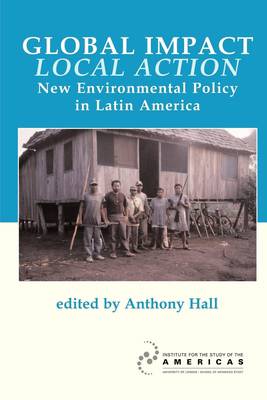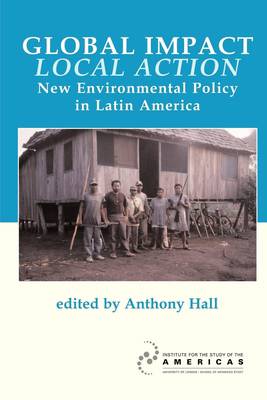
Bedankt voor het vertrouwen het afgelopen jaar! Om jou te bedanken bieden we GRATIS verzending (in België) aan op alles gedurende de hele maand januari.
- Afhalen na 1 uur in een winkel met voorraad
- In januari gratis thuislevering in België
- Ruim aanbod met 7 miljoen producten
Bedankt voor het vertrouwen het afgelopen jaar! Om jou te bedanken bieden we GRATIS verzending (in België) aan op alles gedurende de hele maand januari.
- Afhalen na 1 uur in een winkel met voorraad
- In januari gratis thuislevering in België
- Ruim aanbod met 7 miljoen producten
Zoeken
Global Impact, Local Action
New Environmental Policy in Latin America
€ 35,95
+ 71 punten
Omschrijving
The fragile forest ecosystems in Latin America have long served domestic economic interests through timber production, mining, land resettlement, and cattle ranching. Over the past two decades, the demands on this natural resource base have been exacerbated by transnational commercial and political forces. These forces include MERCOSUR (the world's second largest customs union, composed of Argentina, Bolivia, Brazil, Chile, Paraguay, and Uruguay), the Kyoto Protocol, and international environmental organizations. As threats to the region's endangered ecosystems have grown, so have new approaches to stem the damage by incorporating local populations in decentralized systems of resource management. This volume examines several of the innovative strategies being tested in the Amazon rainforest. These attempts, involving multi-institutional responses to environmental threats, are showing initial results that offer cautious hope for the future.
Contributors include Martin Coy (Geographical Institute, University of Innsbruck, Austria), Herve Thery (Ecole Normal Superieur, Paris and Centre for Sustainable Development, University of Brasilia), David Cleary (Nature Conservancy, Brazil), Phil Fearnside (National Institute for Amazonian Studies, Brazil), Neli Aparecida de Mello (Centre for Sustainable Development, University of Brasilia), John Redwood (Environmentally and Socially Sustainable Development for Latin America and the Caribbean, World Bank), Martina Neuburger (University of Tuebingen, Germany), Dan Pasca (University of Tuebingen), Judith Lisansky (World Bank), Sergio Rosendo (Centre for Social and Economic Research on the Global Environment, University of East Anglia, UK), Fabio de Castro (Anthropological Center for Training and Research on Global Environmental Change, Indiana University, and Nucleo de Estudos e Pesquisa Ambiental, University of Campinas, Brazil), and Larissa Chermont (London School of Economics and Political Science, and Federal University of Para, Belem, Brazil).
Contributors include Martin Coy (Geographical Institute, University of Innsbruck, Austria), Herve Thery (Ecole Normal Superieur, Paris and Centre for Sustainable Development, University of Brasilia), David Cleary (Nature Conservancy, Brazil), Phil Fearnside (National Institute for Amazonian Studies, Brazil), Neli Aparecida de Mello (Centre for Sustainable Development, University of Brasilia), John Redwood (Environmentally and Socially Sustainable Development for Latin America and the Caribbean, World Bank), Martina Neuburger (University of Tuebingen, Germany), Dan Pasca (University of Tuebingen), Judith Lisansky (World Bank), Sergio Rosendo (Centre for Social and Economic Research on the Global Environment, University of East Anglia, UK), Fabio de Castro (Anthropological Center for Training and Research on Global Environmental Change, Indiana University, and Nucleo de Estudos e Pesquisa Ambiental, University of Campinas, Brazil), and Larissa Chermont (London School of Economics and Political Science, and Federal University of Para, Belem, Brazil).
Specificaties
Betrokkenen
- Uitgeverij:
Inhoud
- Aantal bladzijden:
- 321
- Taal:
- Engels
- Reeks:
Eigenschappen
- Productcode (EAN):
- 9781900039567
- Verschijningsdatum:
- 1/12/2005
- Uitvoering:
- Paperback
- Formaat:
- Trade paperback (VS)
- Afmetingen:
- 138 mm x 203 mm
- Gewicht:
- 970 g

Alleen bij Standaard Boekhandel
+ 71 punten op je klantenkaart van Standaard Boekhandel
Beoordelingen
We publiceren alleen reviews die voldoen aan de voorwaarden voor reviews. Bekijk onze voorwaarden voor reviews.








